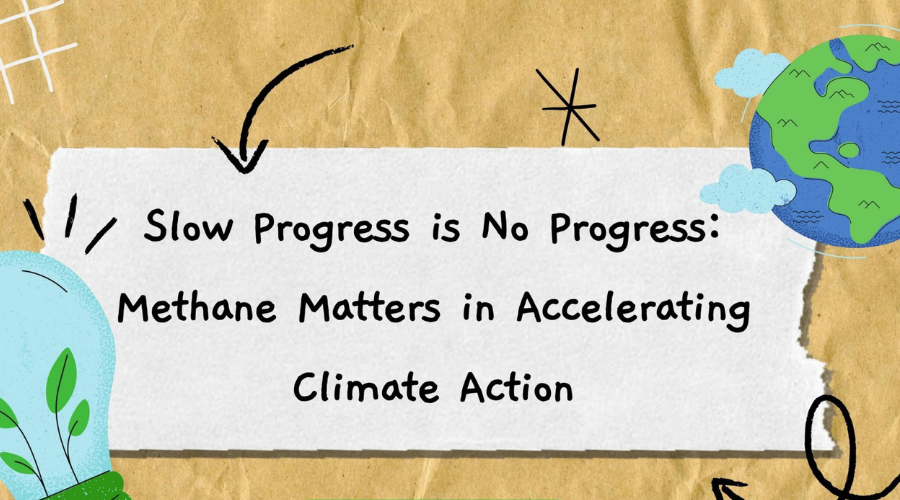
Navigating the Drain: Policy Challenges and IPCC’s Role in CDR
10 July 2025
The Impact of Climate Attribution Science on Global Climate Action
10 July 2025By Livia MORSCHER
Extreme heatwaves, deadly wet-bulb temperatures, and natural disasters that seem to leap straight from the pages of a science fiction novel are becoming our new reality. With the current policies in place, we are on the fast track to three degrees of global warming (IPCC, 2022). While Hollywood has always enjoyed imagining the end of the world, we are confronting a crisis that no cinematic hero can easily solve — the urgent need to halt carbon dioxide (CO2) emissions to prevent a climate catastrophe. Methane, a potent greenhouse gas, could buy us more time.
Even with immediate and substantial cuts in CO2 emissions, the planet will not cool down overnight (IPCC, 2023). CO2 is a long-lived greenhouse gas, a clingy guest at the atmospheric party that does not take a hint easily — meaning the effects of our carbon diet will take decades to show. The temperature on Earth’s thermostat will only begin to dip after climbing to an initial peak (IPCC, 2023). This slow response is not just a test of our patience in an age of instant gratification; it’s a high-stakes gamble. Should the reversal of global warming come only after we have crossed essential tipping points, we may witness the Antarctic ice sheets locked in unalterable decline and warm-water coral reefs transform in ways no amount of coral-friendly sunscreen can fix (Lenton et al., 2023).
While CO2 is the clear protagonist in discussions about climate change, another critical actor has long been overlooked: Methane has contributed as much as 0.5 degrees to global warming since the industrial age, second only to CO2 (Nature, 2021). It is the main ingredient of natural gas and increased in use by over 50% within two decades, praised as a cleaner alternative in the fossil fuel portfolio. Yet, its environmental resume is not spotless. Although methane’s concentration in the atmosphere is about 200 times lower than CO2’s, it traps heat approximately 80 times more effectively, making it a heavyweight in global warming. It only remains in the atmosphere for a relatively brief period, roughly a decade, offering us a quicker climate fix (Nature, 2021).
Reducing methane emissions could buy us valuable time and the tools we need are already at our fingertips. Ocko and her team report that by 2030, global methane emissions could be slashed by a staggering 57% (Ocko et al., 2021). Almost a quarter of these emissions could be cut with no net costs (Nature, 2021). The importance of methane reduction is increasingly acknowledged in the political arena, evidenced by initiatives such as the Global Methane Pledge, in which 155 countries commit to a 30% reduction in methane emissions by 2030 (Global Methane Pledge, 2023). The oil and gas industry plays a crucial role in this effort, with the right infrastructure and a clear financial motive to reduce methane leaks — after all, more methane in the pipes equals more profit. In many other industries, methane could be turned into electricity, transforming a potent pollutant into a power source (Nature, 2021).
A study published in Environmental Research Letters reveals that with aggressive methane reduction, our CO2 budget could expand by 25% (Rogelj et al., 2015). This is not a free pass to ease up on CO2 limits. Even with this leeway, we still need to peak global emissions within the next decade and hit net zero by 2050 (Rogelj et al., 2015). Tackling methane and other potent greenhouse gases does not solve the problem; it merely softens the blow. And it keeps the rapidly narrowing window to secure a habitable planet open just a little longer.
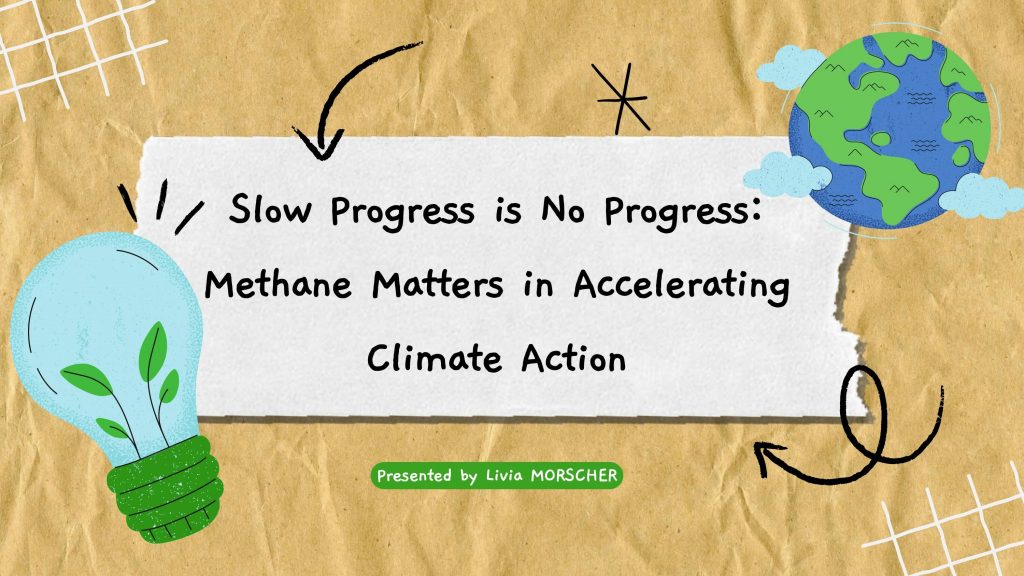
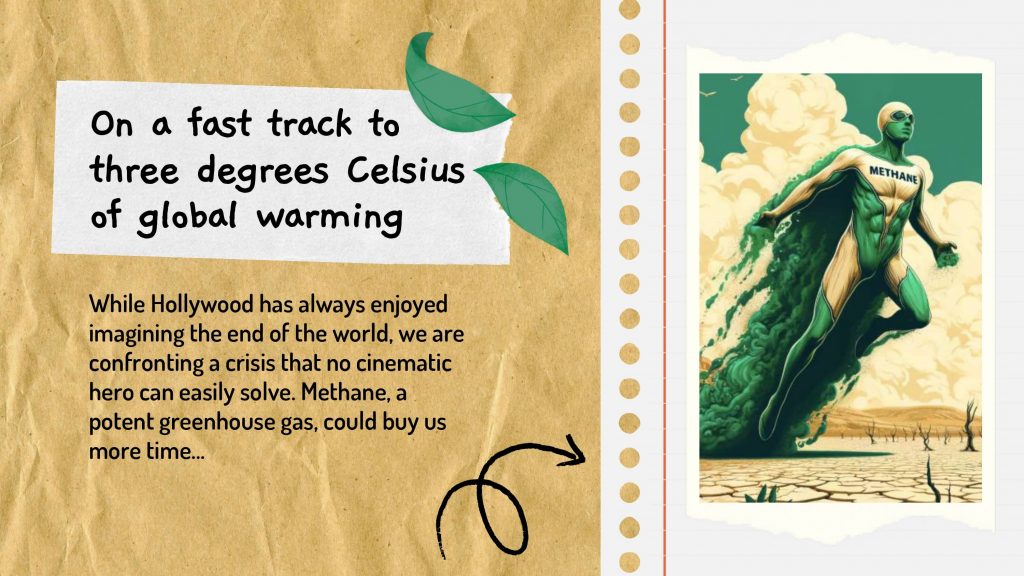
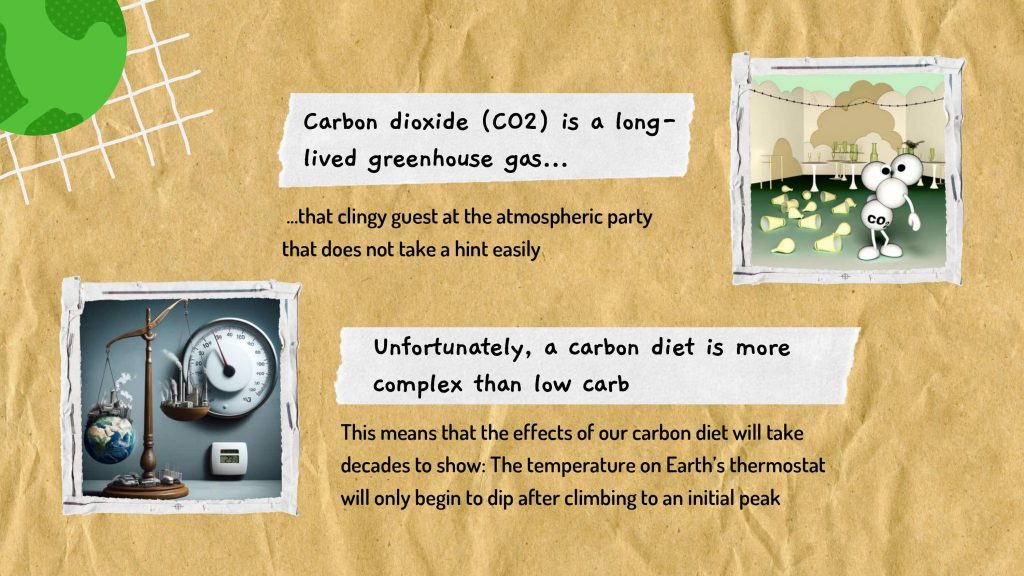
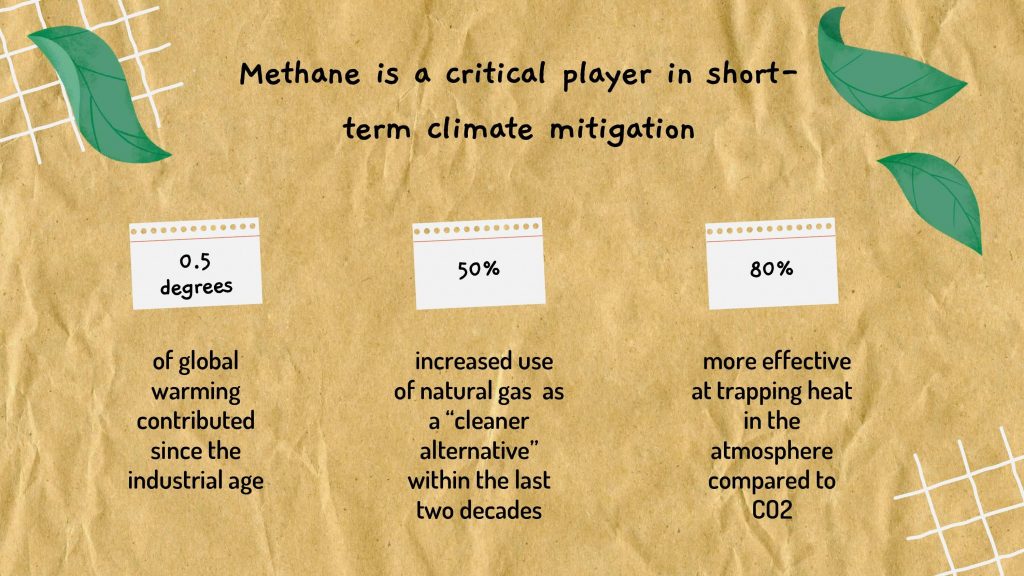
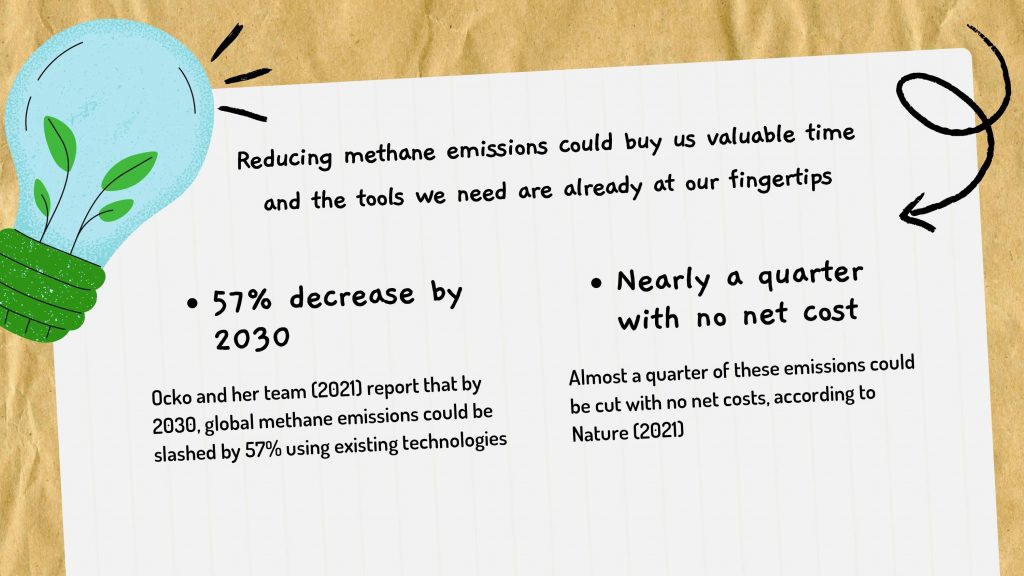
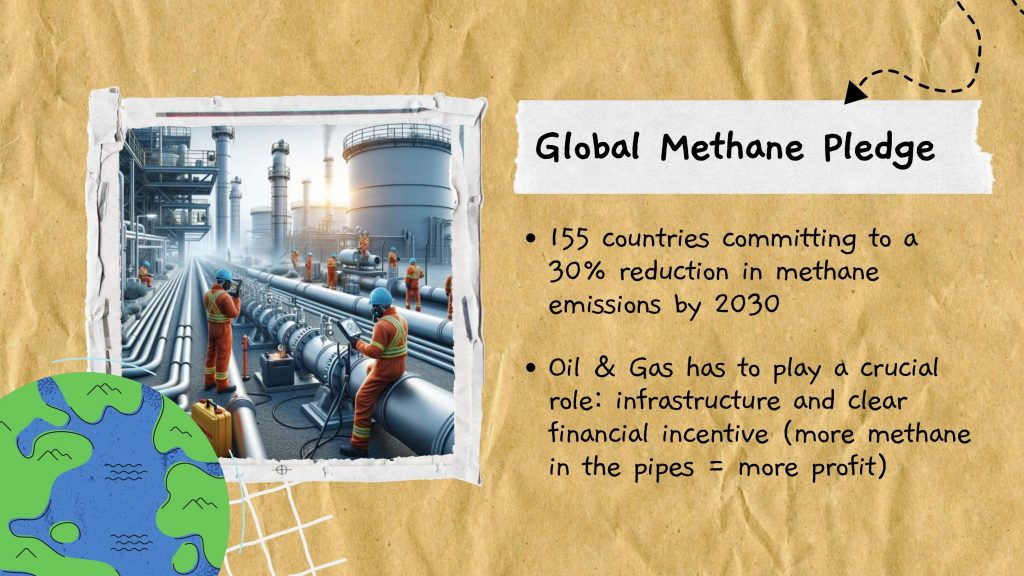
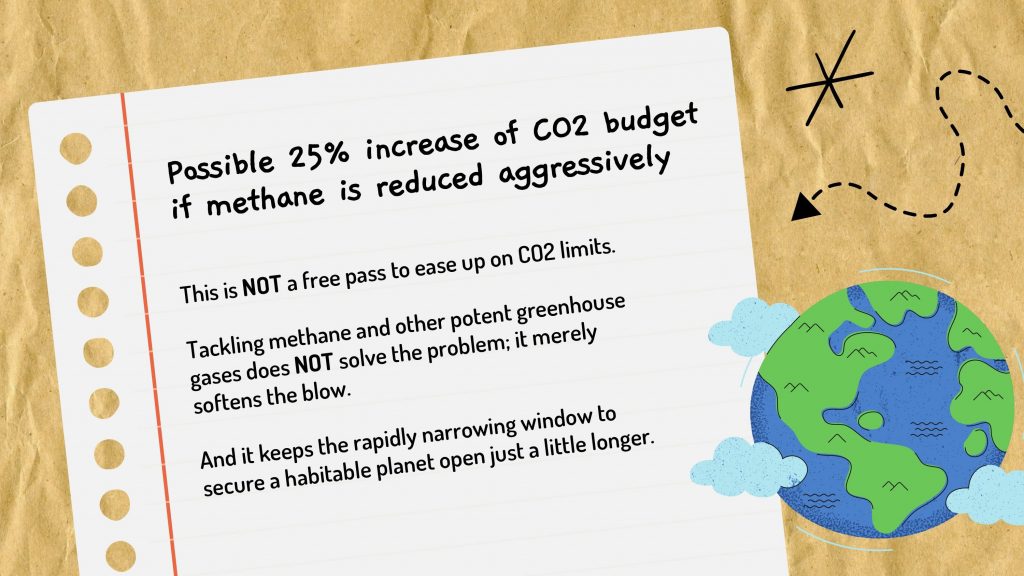

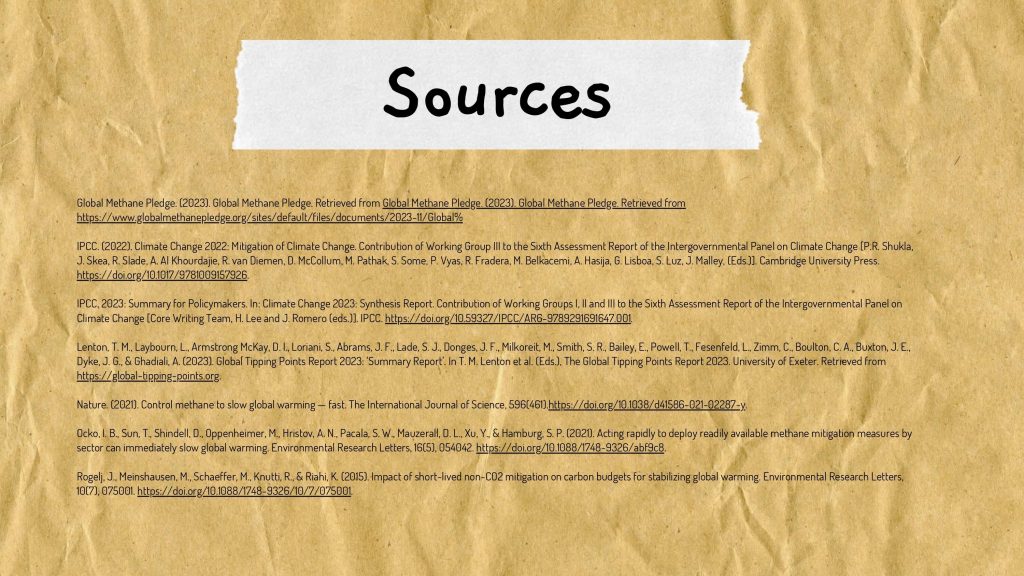
References
Global Methane Pledge. (2023). Global Methane Pledge. Retrieved from https://www.globalmethanepledge.org/sites/default/files/documents/2023-11/Global%20Methane%20Pledge.pdf
IPCC. (2022). Climate Change 2022: Mitigation of Climate Change. Contribution of Working Group III to the Sixth Assessment Report of the Intergovernmental Panel on Climate Change [P.R. Shukla, J. Skea, R. Slade, A. Al Khourdajie, R. van Diemen, D. McCollum, M. Pathak, S. Some, P. Vyas, R. Fradera, M. Belkacemi, A. Hasija, G. Lisboa, S. Luz, J. Malley, (Eds.)]. Cambridge University Press. https://doi.org/10.1017/9781009157926.
IPCC, 2023: Summary for Policymakers. In: Climate Change 2023: Synthesis Report. Contribution of Working Groups I, II and III to the Sixth Assessment Report of the Intergovernmental Panel on Climate Change [Core Writing Team, H. Lee and J. Romero (eds.)]. IPCC. https://doi.org/10.59327/IPCC/AR6-9789291691647.001.
Lenton, T. M., Laybourn, L., Armstrong McKay, D. I., Loriani, S., Abrams, J. F., Lade, S. J., Donges, J. F., Milkoreit, M., Smith, S. R., Bailey, E., Powell, T., Fesenfeld, L., Zimm, C., Boulton, C. A., Buxton, J. E., Dyke, J. G., & Ghadiali, A. (2023). Global Tipping Points Report 2023: ‘Summary Report’. In T. M. Lenton et al. (Eds.), The Global Tipping Points Report 2023. University of Exeter. Retrieved from https://global-tipping-points.org.
Nature. (2021). Control methane to slow global warming — fast. The International Journal of Science, 596(461). https://doi.org/10.1038/d41586-021-02287-y.
Ocko, I. B., Sun, T., Shindell, D., Oppenheimer, M., Hristov, A. N., Pacala, S. W., Mauzerall, D. L., Xu, Y., & Hamburg, S. P. (2021). Acting rapidly to deploy readily available methane mitigation measures by sector can immediately slow global warming. Environmental Research Letters, 16(5), 054042. https://doi.org/10.1088/1748-9326/abf9c8.
Rogelj, J., Meinshausen, M., Schaeffer, M., Knutti, R., & Riahi, K. (2015). Impact of short-lived non-CO2 mitigation on carbon budgets for stabilizing global warming. Environmental Research Letters, 10(7), 075001. https://doi.org/10.1088/1748-9326/10/7/075001.


